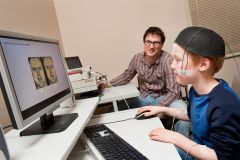Burt remembers when he started his PhD project. “I stepped into my office feeling both trepidation, because of the vast amount of literature to be reviewed; and excitement, because of the potential for scientific discovery and contributing something new to the field. I have managed by just taking each day at a time. Looking back, it's been a relatively straightforward process.”
Burt was attracted to the University of Otago after completing a Masters degree in the United States where he worked in a lab running a longitudinal study examining over-activity and inattention in preschoolers. From this background he became interested in the social functioning of children with attention deficit/ hyperactivity disorder (ADHD).
“My research project investigates the physiological and psychological experiences that children with and without ADHD have when processing and responding to emotional and socially relevant information. It integrates aspects of clinical psychology, such as conducting clinical interviews and administering cognitive assessments, as well as experimental cognitive and social psychology and psychophysiology.”
Burt explains that one of the best aspects of studying in the Psychology Department has been the academic staff. “I have found everyone in the department to be really approachable and happy to discuss my project, which has been a huge help in developing and refining some of the ideas.” The department's technology staff have also been of enormous assistance. “These people are so talented – they've given me a lot of creative freedom in designing my experiments,” Burt says.
Another exciting aspect about the research is being able to collaborate with other graduate students. “Under the support of Professor Ted Ruffman and Dr Dione Healey, the project has grown to also incorporate several masters' projects that examine such things as family and school environments. This has been a great experience. It's always a lot more fun working on a project within groups and we're all able to help and learn from each other”.
The most enjoyable aspect about conducting research in this area is being able to work with the children and families participating in the study. “It hardly feels like work when a lot of what we're doing is hanging out and talking to them. Each child and family bring their own unique and exciting story to the research project”.
At this stage the preliminary results from the project are promising. There has been a lot of positive feedback regarding findings that were presented at a conference earlier this year. Burt is anticipating that he will be able to present further results at a conference in Europe next year.
“Conferences provide great opportunities to discuss your research further with other young scientists and world leading experts; or be inspired by what others are doing in this area.”
So what is Burt hoping to see from the research project?
“While at this stage the project seems like it will help provide answers to some of our questions, as always seems to be the case with science, it raises further areas of enquiry that I hope to explore in the future”.

Burt Hatch
Department of Psychology
